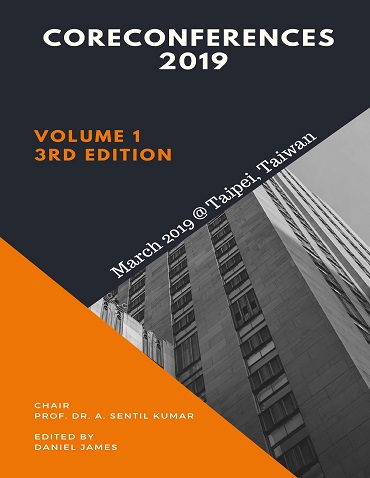- Publication Meta:Value
- Short Title:CC Batch A 2019
- Publisher:ASDF, India
- ISBN 13:978-93-88122-06-1
- ISBN 10:93-88122-06-2
- Language:English
- Type:Hard Bound - Printed Book
- Copyrights:CC Batch A Organizers/DCRC, London, UK
- Editor-in-Chief:Dr A Senthilkumar
- Conference Dates:20 - 21, March 2019
- Venue Country:Taipei, Taiwan
- Submitted Papers:227
- Acceptance Rate:8.51%
- Website:www.coreconferences.com
Welcome to ASDF Electronic Digital Library!
CoreConferences 2019
CoreConferences 2019
International Conference on Education, Transportation and Disaster Management 2019
Paper 015
Developing a Strategic Organisational Learning Framework to Improve Caribbean Disaster Management Performance
Joanne Persad1
Abstract
Disasters are social constructs and require an agility and adaptability from national disaster organisations (NDOs). The environment in which NDOs operate are complex adaptive systems environment, and organisational learning as a key approach is considered fundamental to strengthening the ability of an NDO to perform at its best. With the potential for loss of lives, the destruction of critical infrastructure and housing and to the risk of setting back a country's economic development by many years, learning from the lessons of the past, to reduce the negative impacts is critical for the onward growth of Caribbean countries which, for the most part, are small island developing states. The Caribbean Region is the one of the most hazard prone regions in the world (Walbrent College 2012). Lessons from disaster impacts are identified, gaps are well documented, and failures are sometimes exposed. But learning, in terms of making changes to improve systems, performance and resilience, is questionable. The lessons must be applied for change to occur, this is part of the knowledge management process in the context of disaster organisations. The purpose of this study is to explore the apparent inability of national disaster organizations in the Caribbean to apply the lessons learnt from previous disasters. Three (3) Caribbean countries have been selected for this research. It is a multiple case study where the unit of analysis is the national disaster organisation. This study is based on an interpretive paradigm.
Keywords
Author's Profile
Author profile can be generated and linked through our partners World Book of Researchers. To include your profile online Click Here. After it is approved, please email to edlib @ asdf.res.in to create a link with all the papers.
e-AID
CoreConferences.2019.015
Cite this Article as Follows
Joanne Persad. Developing a Strategic Organisational Learning Framework to Improve Caribbean Disaster Management Performance. International Conference on Education, Transportation and Disaster Management (2019): 08. Print.
© 2010 - by EDLIB .
All Rights Reserved.

